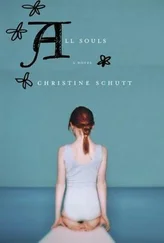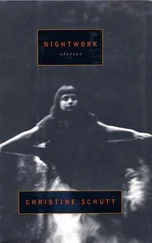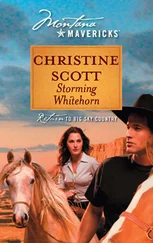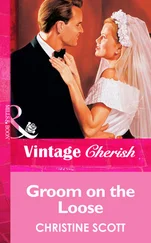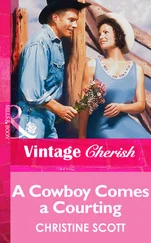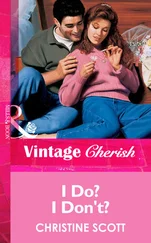Noise abrupt as light, and just as startling for when it came, came late in calmed weather with not even enough heat to explain the rage in the way doors were closed. “All the time,” Arlette said, “they are screaming and clunking and gunning their car.” She said, “They used to hear me.” No one but Arlette in Arlette’s house now, not so much as a picture to prove a Walter existed, some man so big she could hear him clear his throat and spit from as far away as the road.
And why not a husband, except that Arlette was as pretty as a dog-chew — Mother had said. No fun! Done for the day, Arlette stood stunned in the drone of the TV set, forgetting I was even there, despite my croupy breathing. … I didn’t want to go to bed ever, but at Arlette’s every door gave way to where she was. Her back was to the kitchen table and the lineup of old appliances. Our dinner dishes were drying on a dishtowel; the armless chairs were seat-stacked on the table, and the speckled floor was washed. Every night Arlette did this: She did for her house what she had done every day for others. I watched, being quiet, so that I might have company.
Nonna’s wide-awake company, wet eyes on me!
I was thoughtless.
I wasn’t thinking of Nonna when I felt my way through the dead-of-night dark to say I’m home, Nonna. I’ll sleep here if you’d like. Me dressed and smelling of where I had been — some bar, some party, some car with boys.
I grew harder at Nonna’s; I grew older — fifteen.
“Where have you been?” from Miss O’Boyle to me come home — blurry, flushed, plucked. This was the beginning of boys, of my own Bobs and Ricks, and I was late coming home.
Miss O’Boyle said, “You’re just like your mother.”
“You don’t even know her,” I said, but then neither did I: only one visit to the San before she checked out with some Walter.
Miss O’Boyle said, “I know all about her.”
I only knew Mother was somewhere warm with a man she had met while resting. His name I forget, but he had been resting, too, had been a patient, too, if that was the right word for what they had been at the San.
I called Miss O’Boyle a bitch, and in private, a fucking bitch, but what did I call those boys — young men, beaux? — waiting in long cars, most often not theirs, waiting or leaning toward the passenger’s door, saying to me, “Don’t let the cold get in,” saying, “Hurry. We’re already late.”
Sometimes I let a boy wait. Sometimes I never went out but from a far-off window, undetected, watched this boy go about his waiting. I watched what I could see of him, one of those guys who yet never rang the bell for me but waited motionless in the warm car. Perhaps his horn sounded faintly, and the wind took up the noise.
“Yes, yes, yes, yes, yes,” I called out to the first serious man, a creepy boy in business school, I begged, “Please, wait!”
“You bring the boy in the room with you. Did you ever think of that?” This from Miss O’Boyle, Miss O’Boyle on some nights, who was sleeping in the chair but sleeping lightly and on her feet at my approach, largely waiting, saying, “Slow down, turn on the light, I want to see you!”
“Why?”
“Your aunt Frances, that’s why.”
“Do you have anything you want to tell me?” Aunt Frances asked, and Uncle Billy, “Is there anything you have to say? Are you meeting your curfew? Do you even have a curfew? You should not go out on school nights and on the weekends in by eleven. Eleven, twelve. We have to be able to trust you if you want to stay at the Big House. Do you think we can? Can we trust you?” Aunt Frances had the Garden Club and seats on boards in the city, yet she felt obliged to ask, “Is there anything we should know?”
I did not tell — I would not ever tell of what was spoken, of what was understood in the dark of Nonna’s room when, on her side, she was watching. She made an answering sound to the noise I was making. She hissed or spit or slapped the bed by which perhaps she meant, “Don’t do that! It isn’t nice.” But usually Nonna held still and watched; I saw the wetness in her eyes when somehow she knew where my hand was.
“Wind, breakage, often water, booming ice. “Do you hear it?” I asked Nonna.
I rushed to Nonna’s bed and was bending to her mouth to see, was she breathing, when she opened her eyes and saw me, and I was ashamed, jolted, almost excited. What was there in it for me if she died? Drama! I answered. Experience!
“WHAT DID YOU EXPECT would happen if you didn’t come home at all?”
“You don’t know?”
“You don’t, really?”
“Am I to believe such a story?”
“You know who you remind me of, don’t you?”
“YOUR NONNA SAID ONE time she accidentally clobbered your momma with a oar when they was on the lake. She knocked Miss Alice out. She said she thought your momma was dead. And I’m not saying this is true now — okay? but your nonna said the accident might explain the way your momma is.”
AN OLD STORY WAS that my mother and my uncle Billy were fighting on the second-floor landing when he pushed her down the stairs in an argument. Nonna was watching from the foot of the stairs as her children, who were then no longer children, fought for possession of The Clockmaker, an oil the size of a double bed, a clockmaker at his work in windowlight, all fumy, red-based colors. Think of brandy or whiskey, think of whatever was being drunk by Uncle Billy and my mother and that was the painting’s preponderate color — the color of what made them drunkenly fight this way in front of Nonna. But Nonna liked to watch them fight was what my mother said, and I believed her.
I believed Mother when she said the argument with Uncle Billy was about a lot more than money. Of course it was! Nonna’s heart was ridged, rough, dry. The answer was simple: She only had room for Uncle Billy.
I believed Mother when she told me about her father’s mistress, met on a train, although how would Mother know where he had met her? Still I believed Mother when she said the mistress had walked by Daddy on the train. The mistress was an old-fashioned milk-drinker wearing spiked heels, and Daddy followed her.
Daddy’s mistress had a heart that wasn’t bitter.
“Do you believe everything you are told, Alice?” Uncle Billy had asked me in the desert. “Do you?”
Yes, yes, yes, I did. I believed that before Nonna’s tongue thickened, she took her husband out of any story she thought to tell. She talked about her father, instead, and favorite dogs and Uncle Billy’s travels.
I believed that when she had talked about my mother, and she had not often talked about my mother, Nonna frenzied helpless gestures. Talk, talk that was what Nonna did before her stroke, and after her stroke, too. I believe we talked, Nonna and I, and that she told me about my father. There was a flood — remember —and Nonna made waves with her hands.
My father gone away, yes, yes, yes, I was nodding; yes and the storms across the lake in air: stalk, leaf, stillness.
“What else, Nonna, what else do you remember? What? Are you awake enough to talk? Do you think I am like my mother?”
“Quiet,” Miss O’Boyle was saying, “your grandmother is asleep.”
When how could anyone sleep through snows that piled to the third-floor windows, rains that fizzed through screens and puddled sills?
The house was called the Big House, the Big House on the hill. It came with a horse chestnut tree and elms and oaks and a spruce tree I didn’t like, and in the middle of the circular drive something exotic, seeming shortened and level-headed when in blossom.
Читать дальше



